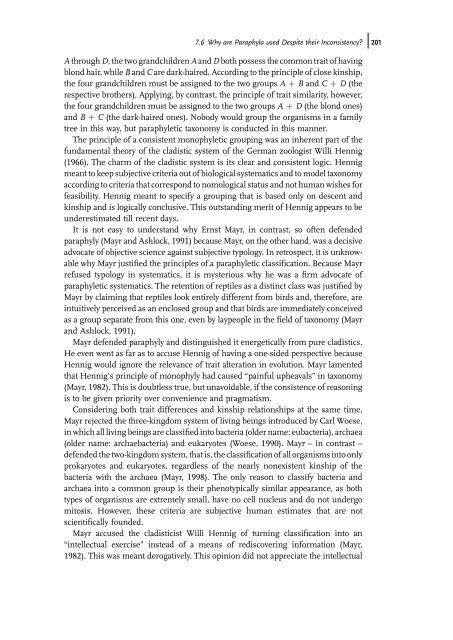Principios de Taxonomia
You also want an ePaper? Increase the reach of your titles
YUMPU automatically turns print PDFs into web optimized ePapers that Google loves.
7.6 Why are Paraphyla used Despite their Inconsistency?j201<br />
A through D, the two grandchildren A and D both possess the common trait of having<br />
blond hair, while B and C are dark-haired. According to the principle of close kinship,<br />
the four grandchildren must be assigned to the two groups A þ B and C þ D (the<br />
respective brothers). Applying, by contrast, the principle of trait similarity, however,<br />
the four grandchildren must be assigned to the two groups A þ D (the blond ones)<br />
and B þ C (the dark-haired ones). Nobody would group the organisms in a family<br />
tree in this way, but paraphyletic taxonomy is conducted in this manner.<br />
The principle of a consistent monophyletic grouping was an inherent part of the<br />
fundamental theory of the cladistic system of the German zoologist Willi Hennig<br />
(1966). The charm of the cladistic system is its clear and consistent logic. Hennig<br />
meant to keep subjective criteria out of biological systematics and to mo<strong>de</strong>l taxonomy<br />
according to criteria that correspond to nomological status and not human wishes for<br />
feasibility. Hennig meant to specify a grouping that is based only on <strong>de</strong>scent and<br />
kinship and is logically conclusive. This outstanding merit of Hennig appears to be<br />
un<strong>de</strong>restimated till recent days.<br />
It is not easy to un<strong>de</strong>rstand why Ernst Mayr, in contrast, so often <strong>de</strong>fen<strong>de</strong>d<br />
paraphyly (Mayr and Ashlock, 1991) because Mayr, on the other hand, was a <strong>de</strong>cisive<br />
advocate of objective science against subjective typology. In retrospect, it is unknowable<br />
why Mayr justified the principles of a paraphyletic classification. Because Mayr<br />
refused typology in systematics, it is mysterious why he was a firm advocate of<br />
paraphyletic systematics. The retention of reptiles as a distinct class was justified by<br />
Mayr by claiming that reptiles look entirely different from birds and, therefore, are<br />
intuitively perceived as an enclosed group and that birds are immediately conceived<br />
as a group separate from this one, even by laypeople in the field of taxonomy (Mayr<br />
and Ashlock, 1991).<br />
Mayr <strong>de</strong>fen<strong>de</strong>d paraphyly and distinguished it energetically from pure cladistics.<br />
He even went as far as to accuse Hennig of having a one-si<strong>de</strong>d perspective because<br />
Hennig would ignore the relevance of trait alteration in evolution. Mayr lamented<br />
that Hennig s principle of monophyly had caused painful upheavals in taxonomy<br />
(Mayr, 1982). This is doubtless true, but unavoidable, if the consistence of reasoning<br />
is to be given priority over convenience and pragmatism.<br />
Consi<strong>de</strong>ring both trait differences and kinship relationships at the same time,<br />
Mayr rejected the three-kingdom system of living beings introduced by Carl Woese,<br />
in which all living beings are classified into bacteria (ol<strong>de</strong>r name: eubacteria), archaea<br />
(ol<strong>de</strong>r name: archaebacteria) and eukaryotes (Woese, 1990). Mayr – in contrast –<br />
<strong>de</strong>fen<strong>de</strong>d the two-kingdom system, that is, the classification of all organisms into only<br />
prokaryotes and eukaryotes, regardless of the nearly nonexistent kinship of the<br />
bacteria with the archaea (Mayr, 1998). The only reason to classify bacteria and<br />
archaea into a common group is their phenotypically similar appearance, as both<br />
types of organisms are extremely small, have no cell nucleus and do not un<strong>de</strong>rgo<br />
mitosis. However, these criteria are subjective human estimates that are not<br />
scientifically foun<strong>de</strong>d.<br />
Mayr accused the cladisticist Willi Hennig of turning classification into an<br />
intellectual exercise instead of a means of rediscovering information (Mayr,<br />
1982). This was meant <strong>de</strong>rogatively. This opinion did not appreciate the intellectual



